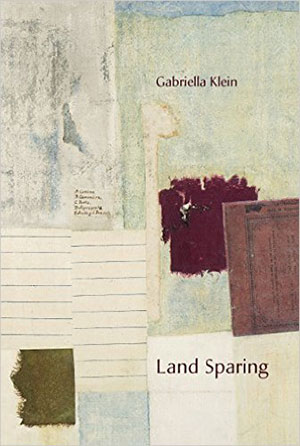An Interview with Gabriella Klein
Santa Barbara Poet’s Debut Book Land Sparing
Gabriella Klein’s first book of poems, the just-published Land Sparing, is winner of the 2013 Nightboat Poetry Prize. Klein earned her undergraduate degree at Wesleyan University and her MFA at Vermont College of Fine Arts. She lives with her husband and daughter in Santa Barbara.
Can you tell me a little about the title of your book and how it might help readers orient themselves toward the poems? Land Sparing is an agricultural practice that attempts to balance conservation with production. This system, in theory, accounts for the preservation of biodiversity as well as the directive to feed over seven billion people on the planet. One increases yield on the land in one place while sparing the land in another; it’s a necessary ecological compromise. Conceptually, we enact this in relationship, as well — to take from each other only what we truly need. Through this lens, one can read the book as a collection of love poems to the Earth — with all the sadness and longing that may imply. Linguistically, as well, it is my proclivity to be spare with language on the landscape of the page. I’m forever stripping my poems down.

Your work is very experimental, yet I think of most of your contemporaries here in Santa Barbara as being fairly traditional in their approach to poetry. How do you see yourself fitting into the local poetry scene, if there is such a thing? I have found the local poetry scene to be quite welcoming and generous. As a whole, they are a high-minded group and not prone to exclusion. I imagine if they were going to grumble, it would be about something imperative, like oil spills or affordable housing, not aesthetic hierarchy. Besides, I believe all poets are experimental and every poem a grand laboratory in which to experiment.
Like alchemy? Alchemy is a key function of poetics. For example, metaphor has the power to enact transformation not unlike the application of heat or pressure upon a raw material. I don’t think it’s possible to get to the truth of a matter without first running it through a process of distillation or titration. In this way a poet converts memory, logic, and emotion into something new and newly understood.
Your grandfather William Dole was an artist famous for his collages. You mention him in the acknowledgements of your collection, and his “Second Architectural Fragment” is the cover of your book. My grandfather was the chair of the art department at UCSB in the 1980s. His work was artistically progressive, a man ahead of his time. His collages have a lyric quality that visually reveals the play of language against silence. I am grateful for my publisher’s consent to his image on the cover. I feel it anchors the family line.
The influence of collage is apparent throughout the collection, as in a poem like “You Are a Bird of Paradise,” which includes the following one-line stanzas: “What if I love you too much? // We affix the bad news with advertisement. // Filling a human inch of sky.” The process of making a poem is not dissimilar to collage. I layer and paste and paste and layer. My poems are never written in one sitting, and over time, ideas get superimposed and images get obscured, then resonate or resurface. I don’t want to come across as difficult, but I think the work of abstraction suits well this disjointed world. It’s only in gluing together fragments of paper or words that we create a cohesive bridge between thought and expression, between self-knowledge and self-abdication.



